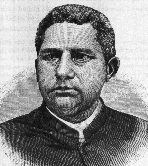by Andre E. Johnson
R3 Editor
 Turner’s activities in helping freed people understand their rights did not please everybody—especially the ones who appreciated Turner’s preaching. Turner admitted that there was some “grumbling with a few of our fastidious church members owing to the fact, as they say, that elder Turner don’t preach as well as formerly because he is so absorbed in politics.” Further, Turner responded:
Turner’s activities in helping freed people understand their rights did not please everybody—especially the ones who appreciated Turner’s preaching. Turner admitted that there was some “grumbling with a few of our fastidious church members owing to the fact, as they say, that elder Turner don’t preach as well as formerly because he is so absorbed in politics.” Further, Turner responded:A small delegation waited on me last night and told me it was admitted by whites and colored that I was one of the ablest ministers in the state, but of late, my sermons were dry and cold and they thought I had better desist a while from political declamations. I simply replied by asking them if I had called on the church for a cent of money in three months? They answered negatively. Then I said, well, brethren, when you are not paying a man for his services you ought to be satisfied with what he gives you. They very politely changed the subject (154).
I gave them to understand that two could not walk together except they be agreed, and if they could not work in harness, because I had a few stewardesses, they had better vacate their positions at once; or I would vacate them without their assistance, and put other men in their places; that I was the pastor of the church, and so far as its spiritual administration, was concerned was responsible to my Bishop and conference, and they were not and if the conference held me alone responsible, then it was my administration and not theirs, and those who could not work with me, must get out of my way. This seemed to have blowed on brakes, and I have heard no more of it (239).
They are more industrious, more regular to time, more concerned about the religious progress of the church, and they find out more that is going on wrong.” All this trouble about members not speaking has been wiped out by them from the church. If they know of two sisters who do not speak, the stewardesses appoint a time, and orde
r the parties before them at some private house; and they sing, pray, and talk over them till they burst into tears and are reconciled, when all go home pleased and happy. They have settled some old cases, which the brethren could do nothing with. (240-241)
I never come into North Carolina unless I become indignant at the miserable condition of our great church. Somebody must go to h—l for the way our church has frittered away here; it would never do for them all to go to heaven after such a willful dereliction of duty, such a result would corrupt messengers of God throughout the universe (136).
I spent four hours at Goldsboro, the other day, and as hard hearted as I am, I had to cry like a child at statements made to me about the condition of our people. One man, with a wife and five children, had not had a dollar this year. What little compensation he received, was paid in an order to a store, where he had to pay two prices for anything he got. I had contempt for the sense of a class of men, before I left home, but Oh! Heavens, what have I now-contempt is no longer a word (136).
The experience shaped Turner profoundly as he continued to ministered to the poor sharecroppers in the South.
Follow Andre on Twitter @aejohnsonphd















